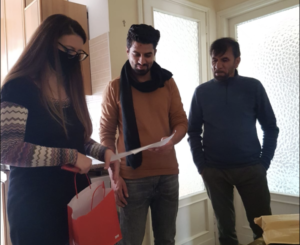In help of 17 families who fled Afghanistan, UCEI and the importance of taking action
 Some of them fled the country without even taking with them their documents. Too much fear of ending up trapped in Afghanistan under the Taliban regime. After having collaborated in different ways with the diplomatic and military Italian mission, they had become a target for the jihadists. So, thanks to a military airlift, hundreds of Afghan families found refuge in Italy. Now a new phase started in their lives, between integration in the society and the procedure to obtain the sought asylum status. A national and local network of organizations and associations took form in order to help them. Among them, on the frontline, the Union of the Italian Jewish Communities immediately guaranteed its commitment.
Some of them fled the country without even taking with them their documents. Too much fear of ending up trapped in Afghanistan under the Taliban regime. After having collaborated in different ways with the diplomatic and military Italian mission, they had become a target for the jihadists. So, thanks to a military airlift, hundreds of Afghan families found refuge in Italy. Now a new phase started in their lives, between integration in the society and the procedure to obtain the sought asylum status. A national and local network of organizations and associations took form in order to help them. Among them, on the frontline, the Union of the Italian Jewish Communities immediately guaranteed its commitment.
Now the UCEI is involved in offering concrete help to 17 Afghan families, scattered around Italy. To some of them, cellphones and sim cards have been recently handed over. “They welcomed us warmly, thanking us because they finally could have sim cards to use”, says to Pagine Ebraiche Elisa Lascar, social worker in charge for the UCEI of the area of northwestern Italy. Along with a small delegation, Lascar brought two devices to families now hosted in the Piedmont region. Among them, a family of seven: two parents and five children, from 17 to 23. When they left, the youngest had just finished school, while the others were studying at Kabul’s university.
“We are talking about well-integrated people, with a good standard of living for Afghanistan. They had to quit everything, without notice, and now have to start again from zero”, explains Silvia Brizio of Ciano International, a catering company that operates in war zones and at high risk for which some of the members of the family rescued to Italy worked. “We have had collaborators who have taken refuge in the mountains and we have helped to reunite with their families inserting them in the lists to leave with military flights”, continues Brizio, who is in contact with the UCEI regarding the 17 families to whom provide assistance.
Many issues are on the table: from the bureaucratic process of applying for asylum, to schooling for minors, to Italian lessons. “Some spoke to me a little in Italian, above all to thank us and then we exchanged a few words in English”, Lascar says. “They were curious about the Jewish community, asked me some questions, and were thrilled about the sim cards”. She was also struck by their great hospitality, which is not granted from people who have experienced a complete upheaval of their lives and are now in a precarious situation. “They are always extraordinarily welcoming,” adds Brizio. “They very much appreciated the gesture of the UCEI. I know that cell phones and sims have also been distributed in Veneto. In any case, even just visiting is a good thing for them, it breaks this sort of isolation in which they find themselves. Of course, there is the difficulty of the language, but they speak English and are working hard for Italian. Many of them speak Arabic, Pashto, Indi and I have the impression that it won’t take long to learn Italian too, also because they are aware that this will help them to emancipate themselves a little “. A path, the one towards emancipation, to which Italian Judaism also wants to make its contribution.
